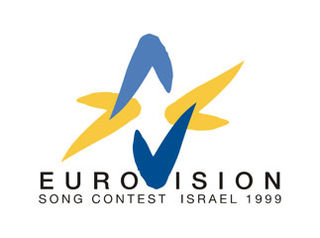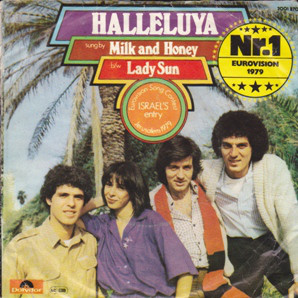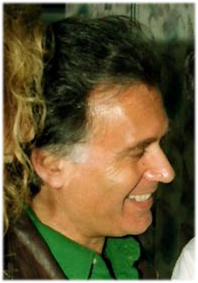
The Eurovision Song Contest 1999 was the 44th edition of the Eurovision Song Contest, held on 29 May 1999 at the International Convention Centre in Jerusalem, Israel. Organised by the European Broadcasting Union (EBU) and host broadcaster Israel Broadcasting Authority (IBA), the contest was held in the country following its victory at the 1998 contest with the song "Diva" by Dana International, and was presented by Dafna Dekel, Yigal Ravid and Sigal Shachmon.

The Eurovision Song Contest 1998 was the 43rd edition of the annual Eurovision Song Contest, held on 9 May 1998 at the National Indoor Arena in Birmingham, United Kingdom. Organised by the European Broadcasting Union (EBU) and host broadcaster the British Broadcasting Corporation (BBC) and presented by Terry Wogan and Ulrika Jonsson, the contest was held in the United Kingdom following the country's victory at the 1997 contest with the song "Love Shine a Light" by Katrina and the Waves.

"Love Shine a Light" is a song by British rock band Katrina and the Waves. It represented the United Kingdom at the Eurovision Song Contest in 1997. It was released as a single on 28 April 1997 and was later included on the band's ninth studio album, Walk on Water (1997), serving as the album's lead single.
Milk and Honey was an Israeli vocal group. The original line-up consisted of Shmulik Bilu, Reuven Gvirtz, Yehuda Tamir and Gali Atari.

Ireland has participated in the Eurovision Song Contest 56 times since making its debut at the 1965 contest in Naples, missing only two contests since, in 1983 and 2002. The contest's final is broadcast in Ireland on RTÉ One. Ireland shares a joint record total of seven wins with Sweden, and is the only country to have won three times consecutively. Ireland has finished second four times, while Sweden has done that just once.

Congratulations: 50 Years of the Eurovision Song Contest was a television programme organised by the European Broadcasting Union (EBU) to commemorate the Eurovision Song Contest's fiftieth anniversary and to determine the contest's most popular entrant of its fifty years. Hosted by Katrina Leskanich and Renārs Kaupers, the event took place at Forum, in Copenhagen on 22 October 2005. The host was Danish broadcaster DR. Fourteen songs from the contest's first half-century, chosen through an internet poll and by a jury, contested the event.
Estonia participated in the Eurovision Song Contest 2003 with the song "Eighties Coming Back" written by Vaiko Eplik. The song was performed by the band Ruffus. The Estonian broadcaster Eesti Televisioon (ETV) organised the national final Eurolaul 2003 in order to select the Estonian entry for the 2003 contest in Riga, Latvia. Ten songs competed in the national final and "Eighties Coming Back" performed by Claire's Birthday was selected as the winner by an international jury panel. The band was later renamed as Ruffus for the Eurovision Song Contest.
Estonia participated in the Eurovision Song Contest 2006 with the song "Through My Window" written by Pearu Paulus, Ilmar Laisaar, Alar Kotkas and Jana Hallas. The song was performed by Sandra Oxenryd. The Estonian broadcaster Eesti Televisioon (ETV) organised the national final Eurolaul 2006 in order to select the Estonian entry for the 2006 contest in Athens, Greece. Ten songs competed in the national final and "Through My Window" performed by Sandra Oxenryd was selected as the winner by a jury panel.

"Hallelujah" was the winning song of the Eurovision Song Contest 1979, performed in Hebrew by Milk and Honey, including Gali Atari, for Israel.
Israel participated in the Eurovision Song Contest 2007 with the song "Push the Button" written by Kobi Oz. The song was performed by the band Teapacks, which was internally selected by the Israeli broadcaster Israel Broadcasting Authority (IBA) in January 2007 to compete at the 2007 contest in Helsinki, Finland. The song Teapacks would perform at Eurovision was selected through the national final Kdam Eurovision 2007 which took place on 27 February 2007 that featured four songs. "Push the Button" emerged as the winning song after achieving the highest score following the combination of votes from an eleven-member jury panel, an online vote and a public vote.
Estonia participated in the Eurovision Song Contest 2002 with the song "Runaway" written by Pearu Paulus, Ilmar Laisaar, Alar Kotkas and Jana Hallas. The song was performed by Sahlene. In addition to participating in the contest, the Estonian broadcaster Eesti Televisioon (ETV) also hosted the Eurovision Song Contest after winning the competition in 2001 with the song "Everybody" performed by Tanel Padar, Dave Benton and 2XL. ETV organised the national final Eurolaul 2002 in order to select the Estonian entry for the 2002 contest in Tallinn. Ten songs competed in the national final and "Runaway" performed by Sahlene was selected as the winner by an international jury panel.
Iceland participated in the Eurovision Song Contest 2008 with the song "This Is My Life" written by Örlygur Smári, Paul Oscar and Peter Fenner. The song was performed by the duo Euroband. Songwriter Paul Oscar represented Iceland in the Eurovision Song Contest 1997 with the song "Minn hinsti dans" where he placed twentieth in the competition. The Icelandic entry for the 2008 contest in Belgrade, Serbia was selected through the national final Söngvakeppni Sjónvarpsins 2008, organised by the Icelandic broadcaster Ríkisútvarpið (RÚV). The selection consisted of eleven heats, a Second Chance round, four semi-finals and a final, held between 6 October 2007 and 23 February 2008. Eight songs ultimately competed in the final, where "This Is My Life" performed by Eurobandið emerged as the winner exclusively through public televoting. The duo was renamed as Euroband for the Eurovision Song Contest.
Israel participated in the Eurovision Song Contest 2008 with the song "The Fire in Your Eyes" written by Dana International and Shay Kerem. The song was performed by Boaz Ma'uda, who was internally selected by the Israeli broadcaster Israel Broadcasting Authority (IBA) in collaboration with the commercial broadcaster Keshet in November 2007 to compete at the 2008 contest in Belgrade, Serbia, The song Ma'uda would perform at Eurovision was selected through the national final Kdam Eurovision 2008 which took place on 15 March 2010 that featured five songs. "Ke'ilu Kan" emerged as the winning song after achieving the highest score following the combination of votes from two regional juries, two thematical jury groups, a jury panel and a public vote. The song title was later translated from Hebrew to English for the Eurovision Song Contest and was titled "The Fire in Your Eyes".
Björgvin Helgi Halldórsson is an Icelandic pop singer from Hafnarfjörður. He represented Iceland in the Eurovision Song Contest 1995 with the song Núna, ranked in 15th place with 31 points.
Israel entered the Eurovision Song Contest 1992 with the song "Ze Rak Sport" by Dafna Dekel after she won the Israeli national final.

Kobi Oshrat is an Israeli composer and conductor. He composed and conducted the winning entry at the 1979 Eurovision Song Contest Hallelujah sung by the vocal ensemble Milk and Honey.
Israel participated in, hosted, and won the 1979 Eurovision Song Contest, which was held on 31 March 1979 at the International Convention Center's Ussishkin Auditorium in Jerusalem. Their entry, "Hallelujah," was composed by Kobi Oshrat, written by Shimrit Orr, and performed by Milk and Honey.
Israel participated in the Eurovision Song Contest 2017. Israeli broadcaster Israel Broadcasting Authority (IBA) collaborated with the commercial broadcaster Keshet and Tedy Productions which organised the reality singing competition HaKokhav HaBa L'Eurovizion to select the singer. The winner of the Israeli national selection was Imri Ziv and a committee of the Israeli broadcaster internally selected for him the song "I Feel Alive" written by Dolev Ram and Penn Hazut. The song was presented to the public on 13 March 2017.
Israel was present at the 1987 Eurovision Song Contest, which was held at the Palais du Centenaire in Brussels, Belgium. Their entry was "Shir Habatlanim", written and composed by Zohar Laskov and performed by actor-comedians Natan Datner and Avi Kushnir, who dubbed themselves the Lazy Bums. The song was selected through Israel's traditional national final, the Kdam Eurovision.
Israel originally planned to participate in the Eurovision Song Contest 2020. The Israeli broadcaster Israeli Public Broadcasting Corporation collaborated with the commercial broadcaster Keshet and Tedy Productions, which organisied the reality singing competition HaKokhav HaBa L'Eurovizion. The competition was won by Eden Alene, with a separate national final, HaShir HaBa L'Eurovizion, held to select her entry "Feker Libi". However, the contest was cancelled due to the COVID-19 pandemic.






